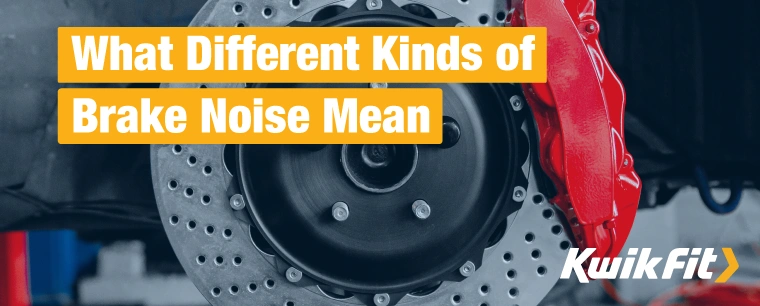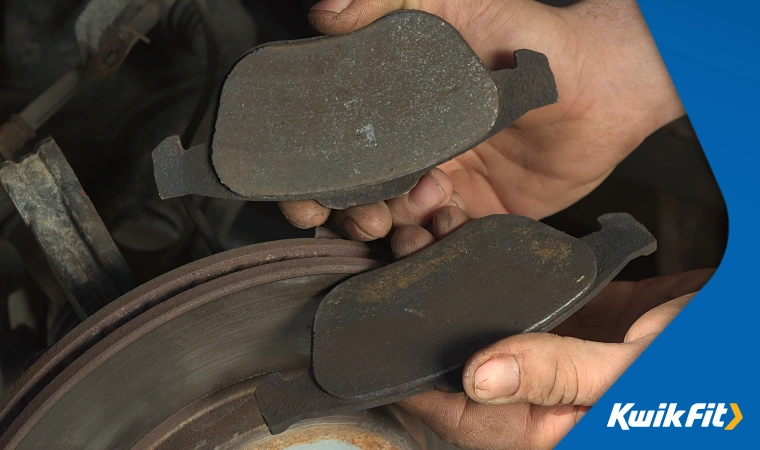What Different Kinds of Brake Noise Mean
Jack Dreyer | Wednesday 7th December 2022 12:45pm

When it comes to staying safe on the road, the most important things you can take note of are tyre condition and brake condition. They’re the two things that keep you in contact with the ground and let you avoid hazards – along with some other helpful parts like headlights and steering, of course!
You might be surprised to find out, for example, that engine condition isn’t covered in an MOT test while things like seatbelts, lights, and brakes feature prominently on the test. The reasoning here is that if your engine gives out while driving, it’ll usually only result in a loss of power – which means you should still be able to slow to a stop or safely pull over to the side of the road.
On the other hand, if your brakes fail while driving then you’re in real trouble!
It’s important, then, to be vigilant with your brake checks and be mindful of when your car is telling you it needs attention. A key thing to keep in mind is the sound of brakes. We’re all used to brakes making noise, but should they? And what do the different kinds of brake noise mean?
Let’s find out.
Squeaking brakes
Squeaking noises (very high pitch) can just be a normal part of braking, especially if it’s been raining and there’s likely to be water around the brake discs and pads. This noise can indicate an incorrectly installed brake pad (more on this later) but more often than not is simply a symptom of cheap brake pads – especially when they’re new.
Juddering noise while braking
If you’re hearing a juddering while applying the brakes then it could be the ABS (anti-lock brake) system kicking in – this will usually happen if you’re slowing down quickly or trying to slow down while going down a particularly steep hill.
A healthy ABS system sounds like a series of very quick, somewhat low frequency thuds as the brake pads open and close to stop you going into a skid. The exact sound will vary based on the car you're driving and how much the cab is isolated from the outside – but use your intuition here if it only happens when applying the brakes suddenly.
If you get a juddering at any point of applying the brakes, a loose brake pad or caliper could be the option. More usually, this indicates damage, corrosion, or uneven wear on the brake rotor. This will have an impact on braking ability so is absolutely worth having checked out by a professional.
Squealing
A squealing sound can also be caused by a loose brake pad. If it’s not been fitted properly, or a retainer pin has broken, then the pad will vibrate against the brake disc and cause a medium-high frequency squeal.
Usually, if it’s due to something having been improperly fitted or having broken, then it’ll only happen on one particular wheel – after all, it’s unlikely that components on every brake assembly would be broken at the same time. Try rolling the windows down and listening out for whether the noise is in a particular corner.
Once brake pads wear down enough, you’ll start to hear a squeal that’s caused by the wear indicator – a strip of metal that rubs against the brake discs in order to make a noise as a warning.
Grinding noise

A grinding noise sounding like a low ‘H’ sound should be a big red flag. This usually means that metal is rubbing on metal or, more specifically, that you no longer have brake pads. Not only will this make stopping much more difficult (you may have noticed the ABS kicking in more frequently or that it takes you a lot longer to stop) but, left unchecked, can result in very costly wear.
This is because leaving the caliper to grind against the brake disc eventually (in not too much time) wears a groove into the brake disc, to the point where it develops a ‘lip’. At this point, the disc will need replacing, and quite possibly the caliper and brake pads along with it.o
Keep your brakes braking with Kwik Fit
But this isn’t just a question of cost – proactive brake checks, car maintenance, and servicing certainly can save you a lot of money in the long run, but the real cost is in safety.
Get in touch with the experts at your local Kwik Fit to talk about any brake problems.
Any facts, figures and prices shown in our blog articles are correct at time of publication.
Featured Articles
Is it Illegal to Drive With One Headlight?
Saturday 19th July 2025
Wondering if it’s illegal to drive with one headlight? Learn about the safety risks and penalties of illegal blown bulbs and why you should fix them promptly.
Air Con in EVs & Hybrids: Experts Answer Your Questions
Monday 30th June 2025
Does air con drain EV batteries? Can you use the air con while charging an electric car? Find out the answers to these questions & more from Kwik Fit’s experts.
Why Is Your Car Making a Noise? Fixes & Tips
Friday 13th June 2025
When your car starts making unexpected noises, it can certainly be quite disconcerting; it may be nothing to worry about, but here’s what you need to know.









